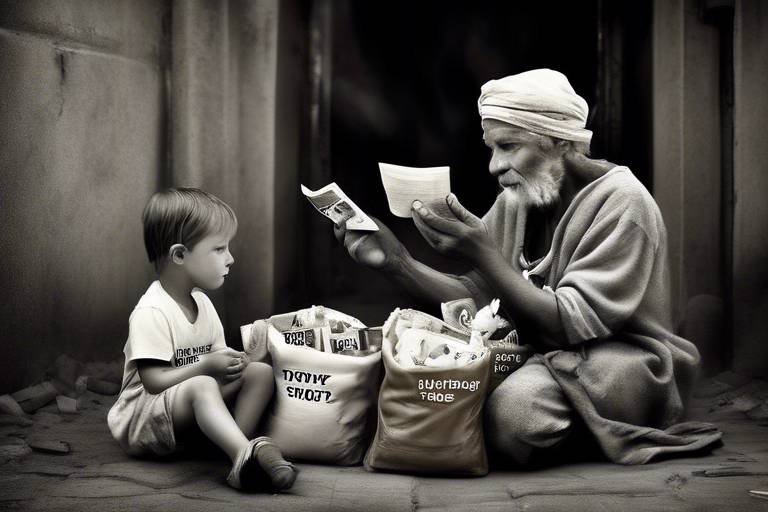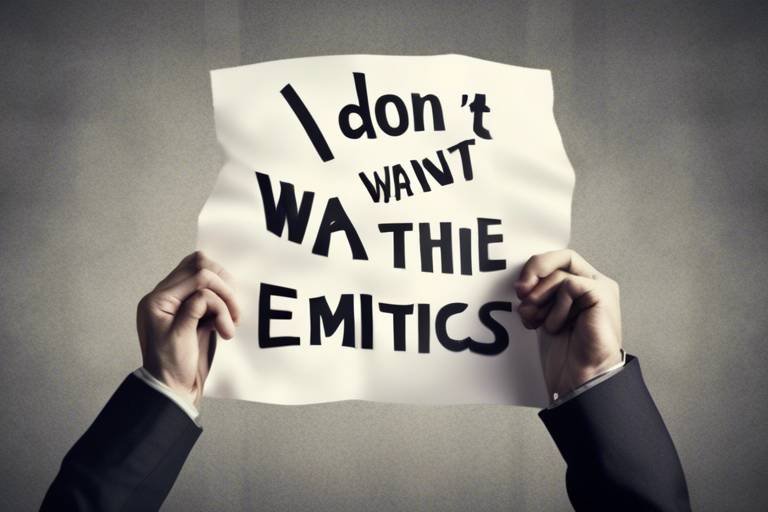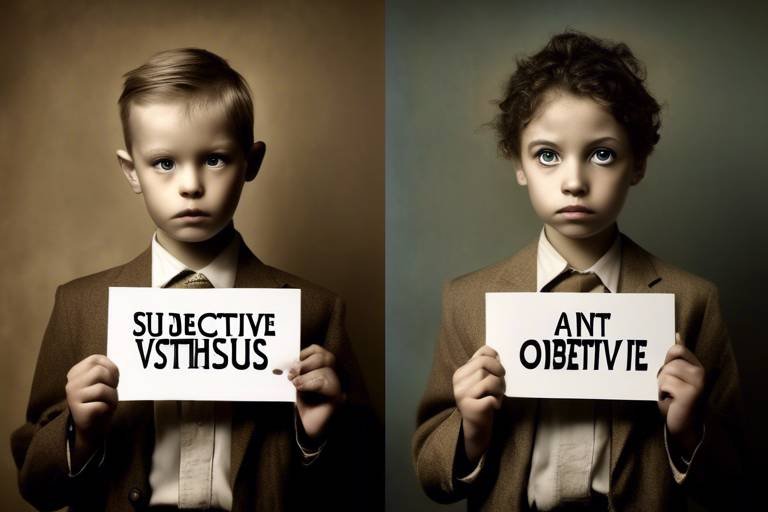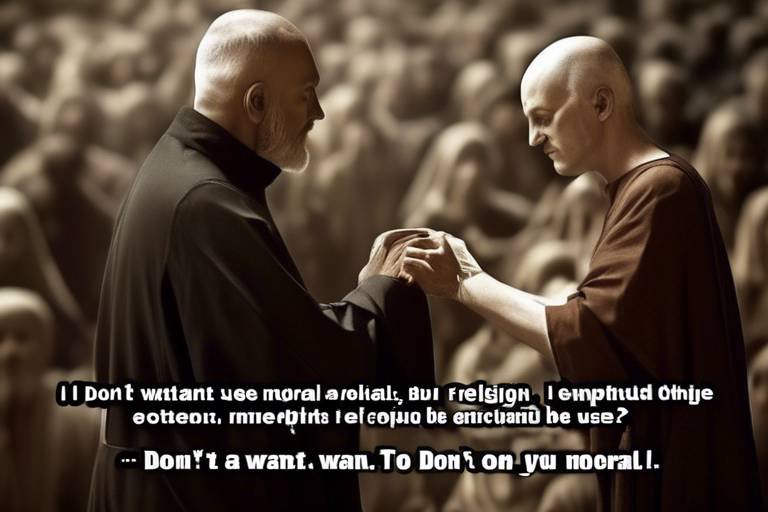Whistleblowing - A Moral Duty or Ethical Dilemma?
Whistleblowing is a term that often evokes strong emotions and heated debates. It raises questions about morality, courage, and the very fabric of our ethical beliefs. Is it a sacred duty to expose wrongdoing, or is it an act that can lead to devastating consequences for the whistleblower? As we navigate through this complex landscape, we find ourselves grappling with the motivations behind whistleblowing, the societal implications, and the personal costs involved. The journey of a whistleblower is rarely straightforward; it’s filled with twists and turns, akin to a thrilling novel where the protagonist must choose between loyalty and integrity.
At its core, whistleblowing involves reporting unethical or illegal activities within an organization. This could range from exposing corporate fraud to revealing safety violations that endanger lives. However, the act of blowing the whistle isn't just about the act itself; it’s about the ethical dilemmas that accompany it. Individuals often find themselves at a crossroads, weighing their duty to their employer against their responsibility to society. This internal conflict can be likened to a moral tug-of-war, where each side pulls fiercely, and the outcome can change lives forever.
Understanding the motivations behind whistleblowing is crucial. Many whistleblowers are driven by a sense of justice, a desire to protect others, or a commitment to transparency. Others may feel compelled to act after witnessing wrongdoing that goes against their personal values. Regardless of the motivation, the implications of whistleblowing can be profound. It can lead to personal sacrifices, including loss of employment, social ostracism, and emotional distress. Yet, it can also spark necessary change, prompting organizations to reevaluate their practices and policies.
Furthermore, the societal response to whistleblowing has evolved over time. In some cultures, whistleblowers are celebrated as heroes, while in others, they are vilified as traitors. This dichotomy highlights the complex nature of whistleblowing and the varying perceptions of what it means to act in the public interest. As we delve deeper into this topic, we will explore historical perspectives, notable cases, and the legal protections available to whistleblowers, all of which contribute to the ongoing dialogue about whether whistleblowing is indeed a moral duty or an ethical dilemma.
- What is the primary motivation for whistleblowers? Many whistleblowers are motivated by a desire to expose wrongdoing and protect others, often driven by strong personal values.
- Are there legal protections for whistleblowers? Yes, various laws exist to protect whistleblowers from retaliation, ensuring they can report misconduct without fear of losing their jobs.
- What are the potential consequences of whistleblowing? Whistleblowers may face personal and professional repercussions, including job loss, emotional distress, and social isolation.
- How does society view whistleblowers? Societal attitudes towards whistleblowers vary widely; some view them as heroes, while others see them as betrayers.

The Definition of Whistleblowing
Whistleblowing is a term that often conjures up images of brave individuals stepping into the limelight to expose wrongdoing. But what does it really mean? At its core, whistleblowing refers to the act of reporting unethical or illegal activities within an organization. This can be anything from fraud and corruption to safety violations and environmental hazards. The whistleblower, typically an insider, raises their voice to alert authorities or the public about these malpractices, often at great personal risk.
Understanding the different types of whistleblowing is crucial. There are primarily two categories: internal whistleblowing and external whistleblowing. Internal whistleblowing occurs when an employee reports misconduct to someone within the organization, like a manager or a designated ethics officer. On the other hand, external whistleblowing involves reporting to outside entities, such as regulatory agencies, law enforcement, or the media. Each type carries its own set of implications and risks, and the choice between them can often feel like navigating a moral minefield.
Whistleblowing can happen in various contexts, including but not limited to:
- Corporate settings: Employees may expose fraudulent financial practices or unsafe working conditions.
- Government entities: Insiders might reveal corruption or abuse of power.
- Non-profit organizations: Whistleblowers may report misuse of funds or unethical behaviors.
The decision to blow the whistle is rarely straightforward. It often involves weighing the potential benefits of exposing wrongdoing against the risks of retaliation, such as job loss or social ostracism. Whistleblowers might find themselves in a position where they have to choose between loyalty to their employer and their moral obligation to society. This complex decision-making process is what makes whistleblowing not just an act of bravery, but also a significant ethical dilemma.
In summary, whistleblowing serves as a critical mechanism for accountability and transparency across various sectors. By understanding its definition and the contexts in which it occurs, we can better appreciate the personal and societal stakes involved in this courageous act.

Historical Perspectives on Whistleblowing
Whistleblowing is not a new phenomenon; it has roots that stretch deep into history, revealing how society has grappled with the ethical implications of exposing wrongdoing. Over the centuries, significant instances of whistleblowing have shaped public perception and influenced legal frameworks. From ancient times to the modern era, the motivations behind whistleblowing and the reactions it provokes have evolved dramatically.
In ancient civilizations, such as Greece and Rome, whistleblowers were often viewed with suspicion. For instance, in ancient Rome, the act of informing on a fellow citizen was sometimes seen as an act of treachery. However, as societal norms shifted, so did the perception of those who chose to speak out. The Middle Ages brought about a more complex view of whistleblowers, as they were sometimes protected by religious institutions that valued truth and justice over loyalty.
Fast forward to the 20th century, and we see a dramatic shift. The post-World War II era marked a turning point, where whistleblowers began to emerge as heroes in the eyes of the public. The Cold War period saw individuals like Daniel Ellsberg, who leaked the Pentagon Papers, highlighting the government's deceit during the Vietnam War. This act of whistleblowing not only changed the course of public discourse but also set a precedent for future whistleblowers.
Throughout the decades, various laws and protections have been established to support whistleblowers. For example, the Whistleblower Protection Act of 1989 in the United States was a landmark piece of legislation that aimed to shield individuals from retaliation when they reported government misconduct. This legal framework has encouraged more people to come forward, knowing that they have some level of protection.
In recent years, the digital age has transformed the landscape of whistleblowing. The rise of the internet and social media has provided platforms for whistleblowers to share their stories and garner public support. High-profile cases, such as those involving Edward Snowden and Chelsea Manning, have ignited global debates about privacy, security, and government accountability. These instances underscore the changing dynamics of whistleblowing, where the motivations and consequences are often intertwined with technology's reach.
As we reflect on the historical perspectives of whistleblowing, it becomes clear that this act is not merely a personal decision but a societal challenge. Each whistleblower's story contributes to a larger narrative about ethics, accountability, and the ongoing struggle for truth in the face of power. The evolution of whistleblowing throughout history serves as a reminder that the moral duty to speak out against wrongdoing is both timeless and timely.
- What is the historical significance of whistleblowing?
Whistleblowing has historically influenced social change, legal reforms, and public awareness of corruption and misconduct. - Who are some notable historical whistleblowers?
Figures like Daniel Ellsberg, who leaked the Pentagon Papers, and more recent whistleblowers like Edward Snowden have played crucial roles in shaping public discourse. - How have societal attitudes towards whistleblowers changed over time?
Societal attitudes have shifted from viewing whistleblowers as traitors to recognizing them as essential advocates for transparency and accountability.
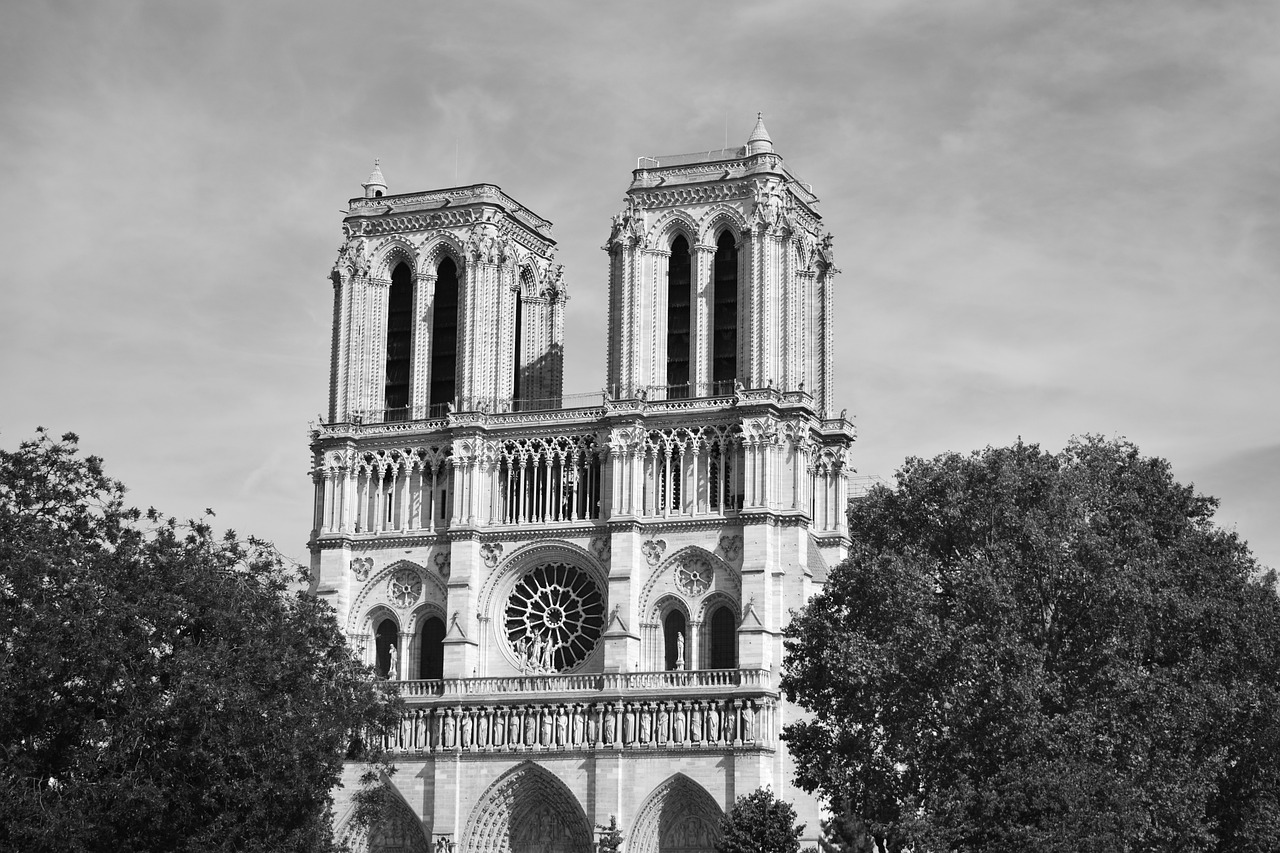
Famous Whistleblowers
Throughout history, whistleblowers have emerged as pivotal figures, often standing at the crossroads of personal conviction and societal obligation. These brave individuals have exposed wrongdoing, corruption, and unethical practices, sometimes at great personal cost. Their stories not only highlight the importance of transparency but also raise questions about the moral responsibilities we hold toward one another in society.
One of the most notable whistleblowers is Daniel Ellsberg, who leaked the Pentagon Papers in 1971. His decision to disclose classified documents revealing the U.S. government's misleading information regarding the Vietnam War ignited a national debate about governmental transparency and accountability. Ellsberg's motivations were deeply rooted in his moral beliefs; he felt it was his duty to inform the public about the truth, despite the potential repercussions he faced, including legal action and social ostracism.
Another key figure is Sherron Watkins, who played a crucial role in exposing the Enron scandal. As a Vice President at Enron, Watkins discovered that the company was engaging in fraudulent accounting practices to hide its debt and inflate profits. Her memo to then-CEO Kenneth Lay warning him about the impending collapse not only showcased her bravery but also highlighted the ethical dilemmas faced by employees in corporate environments. Watkins faced significant backlash and personal risk, yet her actions ultimately contributed to a broader discussion about corporate governance and ethics.
Then there's Mark Felt, famously known as "Deep Throat," who provided critical information to journalists during the Watergate scandal. His decision to leak information about the Nixon administration's involvement in the cover-up of the break-in at the Democratic National Committee headquarters was driven by a commitment to justice and accountability. Felt's actions had profound implications, leading to the resignation of President Nixon and a reevaluation of the relationship between government and the press.
These examples illustrate a common thread among whistleblowers: they are often motivated by a profound sense of ethical responsibility and a desire to protect the greater good. However, their journeys are fraught with challenges. Whistleblowers frequently face immense personal and professional consequences, including retaliation, job loss, and social isolation. The emotional toll can be significant, as they grapple with feelings of betrayal and the weight of their decisions.
In addition to these individual stories, the impact of whistleblowers extends beyond their personal experiences. Their revelations often lead to significant changes in public policy and corporate practices, fostering a culture of accountability. For instance, the fallout from the Enron scandal resulted in the Sarbanes-Oxley Act, which implemented stricter regulations on financial reporting and corporate governance.
In summary, famous whistleblowers such as Daniel Ellsberg, Sherron Watkins, and Mark Felt have played crucial roles in shaping societal norms around transparency and accountability. Their stories serve as powerful reminders of the ethical dilemmas faced by individuals who choose to speak out against wrongdoing. By examining their motivations and the consequences they faced, we can better understand the complex nature of whistleblowing and its significance in our society.
- What qualifies someone as a whistleblower? A whistleblower is typically an employee or insider who reports unethical or illegal activities within an organization, often at the risk of personal or professional repercussions.
- Are there legal protections for whistleblowers? Yes, many countries have laws in place to protect whistleblowers from retaliation, ensuring they can report wrongdoing without fear of losing their jobs or facing other negative consequences.
- What motivates individuals to become whistleblowers? Motivations can vary widely, but common reasons include a strong sense of ethics, a commitment to the truth, and a desire to protect others from harm.
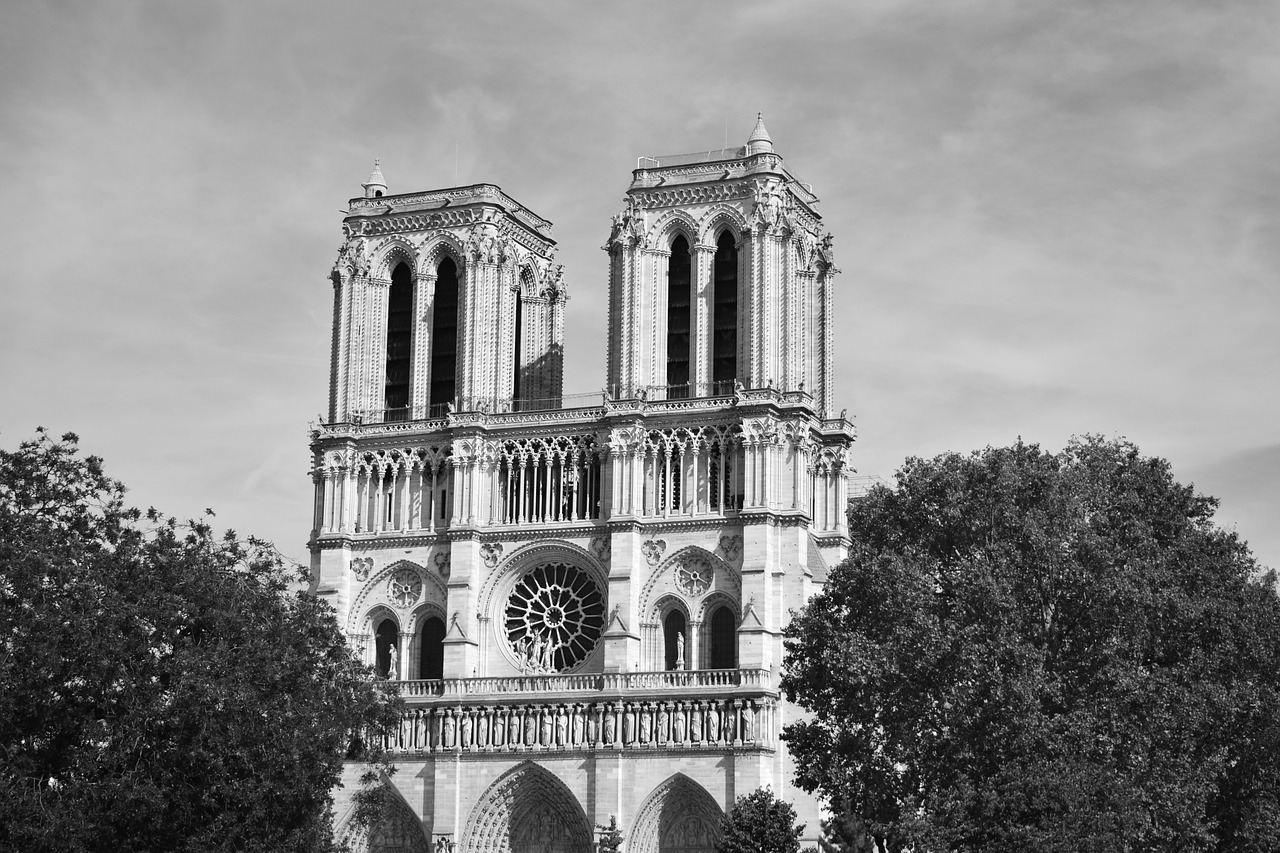
Case Study: Edward Snowden
Edward Snowden, a former National Security Agency (NSA) contractor, became a household name in 2013 when he leaked classified information regarding the United States government's extensive surveillance programs. His actions ignited a fierce global debate about privacy, security, and the ethical responsibilities of individuals in positions of power. But what motivated Snowden to take such a drastic step? Was it a sense of duty, a quest for transparency, or perhaps a combination of both?
Snowden's revelations unveiled the extent to which the NSA was monitoring not just foreign targets but also American citizens. Through programs such as PRISM, the agency was collecting data from major tech companies, raising serious concerns about civil liberties. In the wake of these revelations, many began to question the balance between national security and individual privacy rights. For Snowden, it was a moral imperative to inform the public about these practices, a decision he believed was necessary despite the personal risks involved.
The repercussions of Snowden's actions were monumental. He was charged with espionage and theft of government property, leading to a life in exile in Russia. This case highlights the complex ethical implications of whistleblowing. On one hand, Snowden's actions can be seen as heroic, shining a light on governmental overreach. On the other hand, critics argue that he jeopardized national security and endangered lives by exposing sensitive information.
To better understand the implications of Snowden's case, consider the following aspects:
- Motivation: Snowden claimed that his primary motivation was to inform the public and initiate a debate about privacy and surveillance.
- Consequences: He faced severe legal repercussions, including charges that could lead to decades in prison.
- Public Reaction: The public response was mixed, with some viewing him as a whistleblower and others as a traitor.
Snowden's case also prompted significant changes in public policy and legal frameworks. Following the leaks, there was a push for reform in surveillance practices, leading to the USA Freedom Act in 2015, which aimed to limit the NSA's ability to collect data on American citizens without a warrant. This illustrates how whistleblowers can catalyze change, forcing society to confront uncomfortable truths.
In conclusion, Edward Snowden's case serves as a powerful example of the moral dilemmas associated with whistleblowing. His actions challenge us to consider the fine line between loyalty to one's employer and the ethical obligation to protect the public. As we navigate the complexities of modern governance and personal privacy, Snowden's story remains a crucial touchpoint in discussions about whistleblowing and its consequences.

Case Study: Erin Brockovich
Erin Brockovich is a name synonymous with grassroots activism and environmental justice. Her journey began in the late 1990s when she worked as a legal assistant for a small law firm in California. What started as a routine job quickly transformed into a monumental battle against the Pacific Gas and Electric Company (PG&E) over the contamination of drinking water in Hinkley, California. The case was not just about water pollution; it was about the health and safety of an entire community, and Erin's determination to expose the truth became a beacon of hope for those affected.
What makes Erin's story particularly compelling is her unyielding commitment to the residents of Hinkley, who were suffering from a range of health issues, including cancer and other serious illnesses. She discovered that PG&E had been leaking toxic chromium-6 into the groundwater, a substance linked to severe health risks. This revelation was shocking, but what was even more astonishing was how Erin, a single mother with no formal legal training, took it upon herself to investigate and gather evidence. Her relentless pursuit of justice included interviewing affected residents, collecting medical records, and meticulously documenting the environmental damage.
Erin Brockovich's efforts culminated in a landmark legal case that resulted in a $333 million settlement for the residents of Hinkley. This case not only provided financial restitution for the victims but also raised awareness about the importance of environmental accountability. It highlighted the need for corporate responsibility and the role of individuals in standing up against powerful entities. Erin's story serves as a powerful reminder that one person can make a significant difference, especially when they are fueled by a sense of moral duty.
However, the journey was not without its challenges. Erin faced numerous obstacles along the way, including skepticism from both the legal community and the public. Many questioned her credibility and motives, labeling her as a mere 'legal assistant' without the expertise to tackle such a complex issue. Yet, her passion and perseverance shone through, proving that determination often outweighs formal qualifications. Erin's story is a testament to the idea that whistleblowing can emerge from unexpected places, and that the fight for justice often requires immense personal sacrifice.
In addition to her legal triumph, Erin's story has been immortalized in popular culture, notably through the 2000 film "Erin Brockovich," starring Julia Roberts. The film not only brought Erin's story to a wider audience but also sparked conversations about environmental issues and the importance of whistleblowers in holding corporations accountable. Today, Erin continues to advocate for environmental causes and supports individuals who find themselves in similar situations, emphasizing that the fight for justice is ongoing.
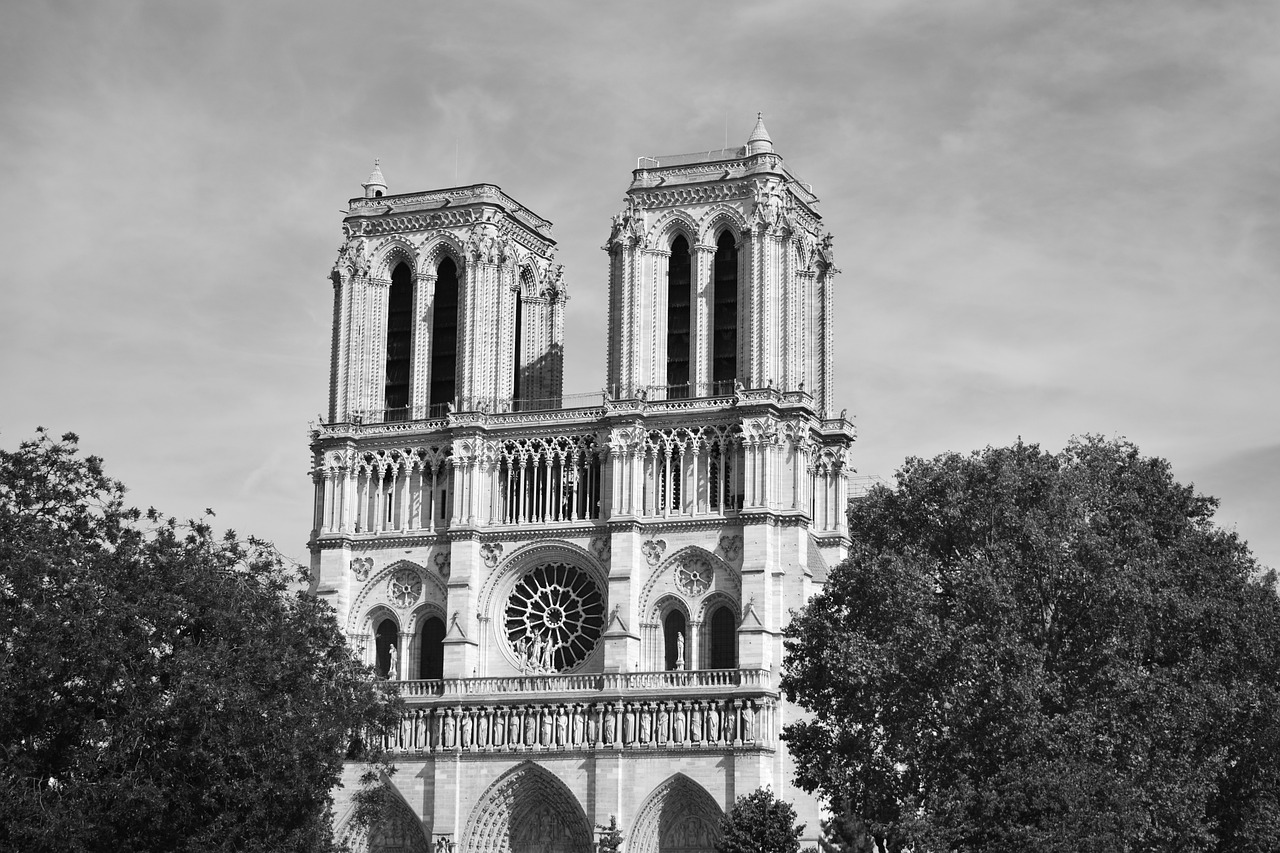
Legal Protections for Whistleblowers
When it comes to whistleblowing, one of the most significant concerns for potential whistleblowers is the fear of retaliation. This fear can often serve as a barrier, preventing individuals from coming forward with information about wrongdoing. Fortunately, numerous legal protections exist to safeguard these courageous individuals, ensuring that they can report unethical practices without the looming threat of job loss or other forms of retribution.
In many countries, laws have been enacted specifically to protect whistleblowers. These laws vary significantly in scope and effectiveness, but they generally aim to create a safer environment for those who choose to speak out. For instance, in the United States, the Whistleblower Protection Act (WPA) provides federal employees with a degree of protection against retaliation when they report misconduct. This legislation is crucial as it encourages individuals to report issues without fearing for their careers.
It's important to understand that legal protections for whistleblowers can cover various types of misconduct, including:
- Fraud or financial misconduct
- Health and safety violations
- Environmental hazards
- Corruption or bribery
Additionally, many states have their own whistleblower protection laws that may offer even broader safeguards than federal laws. These laws can include provisions for reinstatement, back pay, and even compensation for damages incurred due to retaliation. Understanding the specific legal framework in your jurisdiction is crucial for anyone considering whistleblowing.
Another noteworthy aspect of whistleblower protections is the concept of anonymity. Some laws allow whistleblowers to report misconduct anonymously, which can significantly reduce the risk of retaliation. However, anonymity can complicate investigations, as it may be more challenging to verify claims without direct communication with the whistleblower.
Furthermore, organizations themselves may implement internal policies that provide additional protections for whistleblowers. For instance, many companies have established hotlines or designated officers to handle reports of misconduct confidentially. These internal mechanisms can serve as a first line of defense for employees who wish to report unethical behavior without exposing themselves to potential backlash.
In summary, while the decision to blow the whistle can be fraught with anxiety and uncertainty, understanding the legal protections available can empower individuals to take action. These protections are vital not only for the whistleblowers themselves but also for fostering a culture of accountability and integrity within organizations. By ensuring that whistleblowers can report wrongdoing safely, society can work towards a more ethical future.
Q: What should I do if I witness wrongdoing at my workplace?
A: If you witness misconduct, consider documenting your observations and reviewing your organization's whistleblower policy. You may also want to consult with a legal expert to understand your rights and protections.
Q: Can I remain anonymous when reporting misconduct?
A: Many laws and organizational policies allow for anonymous reporting. However, it's essential to understand the limitations of anonymity, as it may affect the investigation process.
Q: What kind of retaliation can whistleblowers face?
A: Retaliation can take many forms, including termination, demotion, harassment, or even negative performance reviews. Legal protections exist to combat these actions, so it's crucial to know your rights.

The Ethical Dilemma of Whistleblowing
Whistleblowing is often a double-edged sword, presenting a complex web of ethical dilemmas that can leave individuals feeling torn between their loyalties and their moral compass. On one hand, there’s the allegiance to one’s employer, a bond that can feel almost familial. On the other, there’s the pressing obligation to expose wrongdoing that could harm others or the public at large. This conflict is not merely an abstract concept; it’s a vivid reality for many who find themselves in situations where they must choose between silence and speaking out.
Consider the emotional turmoil that often accompanies the decision to blow the whistle. The fear of retaliation—be it job loss, social ostracism, or even legal repercussions—can weigh heavily on the conscience. Individuals might ask themselves, “Am I risking everything for a cause that may not even be acknowledged?” This internal struggle can be likened to standing at a crossroads, where each path leads to a different set of consequences. The choice to speak out may seem like an act of bravery, but it can also feel like a leap into the unknown.
Furthermore, the societal context plays a significant role in shaping these ethical dilemmas. In some cultures, whistleblowers are hailed as heroes, celebrated for their courage and integrity. In others, they may be viewed as traitors, undermining the very institutions they are a part of. This variance can influence an individual's decision-making process profoundly. It raises the question: What does it mean to be ethical in a world where values clash?
To better understand the ethical landscape of whistleblowing, it’s helpful to examine some of the common dilemmas faced by potential whistleblowers:
- Confidentiality vs. Transparency: Maintaining confidentiality is often a requirement in many workplaces, but when unethical practices are involved, the need for transparency becomes paramount.
- Loyalty to Colleagues vs. Duty to Society: Employees may feel a strong sense of loyalty to their teammates, making the decision to report misconduct feel like a betrayal.
- Personal Risk vs. Public Good: The potential personal consequences of whistleblowing can be daunting, yet the impact of remaining silent could be far more harmful to the public.
Ultimately, the ethical dilemma of whistleblowing forces individuals to confront their own values and the implications of their choices. It’s a profound reflection of what it means to act with integrity in a world that often prioritizes self-preservation over moral responsibility. The journey of a whistleblower is not just about revealing the truth; it’s about navigating the murky waters of ethics, where every decision can feel like walking a tightrope.
As we delve deeper into the consequences of whistleblowing, it becomes clear that the personal stakes are incredibly high. The emotional, social, and professional impacts can ripple outwards, affecting not just the whistleblower but also their families and communities. The act of whistleblowing is not merely a one-time event; it’s a life-altering decision that can redefine relationships and career paths.
In conclusion, the ethical dilemma of whistleblowing is a multifaceted issue that challenges our understanding of loyalty, integrity, and personal responsibility. It invites us to consider not just what we would do in a similar situation, but also how we can foster environments where ethical behavior is encouraged and protected. By addressing these dilemmas head-on, we can work towards a society that values transparency and accountability, ultimately benefiting us all.
Q: What should I do if I suspect wrongdoing at my workplace?
A: It's crucial to gather as much information as you can and consult your company's whistleblower policy. If you feel safe, you can report your concerns to a trusted supervisor or an appropriate authority.
Q: Are there legal protections for whistleblowers?
A: Yes, many countries have laws that protect whistleblowers from retaliation. These laws vary by jurisdiction, so it’s essential to understand your rights.
Q: What are the potential consequences of whistleblowing?
A: Whistleblowers may face various consequences, including job loss, social ostracism, or legal challenges. However, they may also experience personal satisfaction from doing the right thing.
Q: How can organizations support whistleblowers?
A: Organizations can create a culture of transparency by implementing clear reporting procedures, providing legal protections, and encouraging open dialogue about ethical concerns.

Personal Consequences of Whistleblowing
Whistleblowing is not just about exposing wrongdoing; it’s a personal journey that often comes with a heavy emotional price tag. When individuals choose to blow the whistle, they may find themselves standing at a crossroads, faced with the potential for both personal and professional upheaval. The act of whistleblowing can lead to a myriad of consequences that impact various facets of a whistleblower's life.
First and foremost, **emotional consequences** can be profound. Whistleblowers often experience feelings of isolation, anxiety, and even depression. Imagine being in a workplace where you once felt secure, only to find yourself ostracized for doing what you believed was right. This emotional turmoil can be likened to navigating a stormy sea; the waters are unpredictable, and the journey can feel overwhelmingly lonely.
Social repercussions also play a significant role. Whistleblowers may find their relationships strained, both at work and in their personal lives. Colleagues might distance themselves, viewing the whistleblower as a traitor or a snitch. This social alienation can lead to a sense of betrayal, where the very fabric of trust in professional relationships is torn apart. The fallout can extend beyond the workplace, affecting friendships and family dynamics as well.
Professionally, the consequences can be equally daunting. Many whistleblowers face retaliation, which can manifest in various forms, such as demotion, job loss, or being blacklisted in their industry. For instance, a whistleblower who exposes corporate fraud might find it nearly impossible to secure employment in the same field again. The fear of being labeled a troublemaker can haunt them long after the initial act of whistleblowing. This is where the **legal protections** for whistleblowers become crucial, yet they are not always foolproof.
To illustrate the potential impact on a whistleblower’s career, consider the following table:
| Type of Consequence | Examples |
|---|---|
| Emotional | Depression, anxiety, isolation |
| Social | Strained relationships, ostracism |
| Professional | Job loss, demotion, industry blacklisting |
Moreover, the **financial consequences** cannot be overlooked. Whistleblowers may find themselves in precarious financial situations, especially if they lose their jobs or face prolonged legal battles. The stress of potential unemployment can be overwhelming, leading to a cycle of financial insecurity that further exacerbates emotional distress. It’s a sobering reality that many whistleblowers face: doing the right thing can sometimes lead to devastating financial repercussions.
In light of these challenges, it’s important for potential whistleblowers to weigh their options carefully. Seeking support from trusted friends, family, or professional counseling can help them navigate the emotional landscape that accompanies such a decision. Additionally, understanding the legal protections available can empower them, providing a safety net that may ease some of the fears associated with coming forward.
Ultimately, the personal consequences of whistleblowing are complex and multifaceted. While the act itself can lead to positive change, it often comes at a significant personal cost. Whistleblowers must be prepared for the potential fallout, armed with knowledge and support to help them through this tumultuous journey.
- What should I consider before blowing the whistle? It's essential to weigh the potential personal and professional consequences, seek legal advice, and ensure you have support systems in place.
- Are there legal protections for whistleblowers? Yes, many jurisdictions have laws designed to protect whistleblowers from retaliation, but these protections can vary significantly.
- How can I find support as a whistleblower? Consider reaching out to support groups, legal professionals, or mental health counselors who specialize in whistleblower cases.

Organizational Responses to Whistleblowing
When it comes to whistleblowing, organizations can react in a multitude of ways, and these responses can significantly shape the culture within the workplace. Some organizations embrace whistleblowers, viewing them as courageous individuals who help maintain ethical standards and accountability. Others, however, may resort to punitive measures against those who speak out, creating a chilling effect that discourages future whistleblowing. The way an organization responds can influence not only the whistleblower's experience but also the overall morale and ethical climate of the company.
Organizations that adopt a supportive stance towards whistleblowing often implement whistleblower protection policies. These policies can include:
- Clear reporting channels for employees to voice concerns.
- Assurances of confidentiality and protection from retaliation.
- Regular training sessions to educate employees about ethical practices and the importance of reporting misconduct.
Such proactive measures can foster a culture of transparency and trust, encouraging employees to report unethical behavior without fear. For example, companies like Starbucks and Google have established robust whistleblower policies that not only protect employees but also promote an open dialogue about ethical concerns. This kind of environment can lead to improved employee engagement and loyalty, as workers feel their voices are heard and valued.
On the flip side, organizations that respond negatively to whistleblowing may engage in retaliatory actions. This could manifest in various forms, such as:
- Demotions or job loss.
- Hostile work environments.
- Legal action against the whistleblower.
Such responses can lead to a toxic workplace culture, where employees are hesitant to report wrongdoing for fear of losing their jobs or facing harassment. This not only jeopardizes the organization's integrity but can also lead to significant legal and financial repercussions. A study conducted by the Ethics & Compliance Initiative found that organizations with a culture of retaliation experienced higher instances of misconduct and lower employee morale.
Moreover, the organizational response to whistleblowing can have long-lasting implications. Companies that fail to address whistleblower concerns adequately may face public backlash, loss of reputation, and even regulatory scrutiny. For instance, the infamous case of Enron showcased how ignoring whistleblowing led to catastrophic consequences, not just for the company but for thousands of employees and shareholders.
To summarize, the way an organization responds to whistleblowing is crucial. It can either empower employees to act ethically or create an environment of fear and silence. As we navigate the complexities of workplace ethics, it is essential for companies to reflect on their policies and practices regarding whistleblowing. Ultimately, fostering a culture of openness and support not only benefits the organization but also contributes to a healthier society overall.
Q1: What should I do if I want to blow the whistle?
A1: First, familiarize yourself with your organization's whistleblower policy. Report your concerns through the designated channels, ensuring you document everything. It's crucial to protect yourself by seeking legal advice if necessary.
Q2: Are there legal protections for whistleblowers?
A2: Yes, many countries have laws that protect whistleblowers from retaliation. These laws vary by jurisdiction, so it's essential to understand what protections apply in your case.
Q3: What are the potential consequences of whistleblowing?
A3: Consequences can vary widely. While some whistleblowers may face retaliation or job loss, others may find support and recognition for their actions. The outcome often depends on the organization's culture and the nature of the wrongdoing reported.
Frequently Asked Questions
- What is whistleblowing?
Whistleblowing refers to the act of reporting unethical or illegal activities within an organization. It can involve disclosing information about fraud, corruption, safety violations, or any misconduct that poses a risk to public interest.
- What are the types of whistleblowing?
There are generally two types of whistleblowing: internal and external. Internal whistleblowing occurs when an employee reports wrongdoing within their organization, while external whistleblowing involves reporting to outside entities, such as regulatory agencies or the media.
- What protections do whistleblowers have?
Whistleblowers are often protected by various laws that shield them from retaliation, such as job loss, harassment, or discrimination. In many countries, these protections are designed to encourage individuals to report misconduct without fear of personal repercussions.
- What are the potential consequences of whistleblowing?
While whistleblowing can lead to positive change, it may also result in significant personal consequences. Whistleblowers might face emotional stress, social isolation, or professional setbacks, as they often challenge the status quo within their organizations.
- How should organizations respond to whistleblowing?
Organizations should foster a supportive environment for whistleblowers by implementing clear policies and procedures for reporting misconduct. A positive response can enhance workplace culture and encourage transparency, while punitive measures can lead to a toxic atmosphere.
- Is whistleblowing a moral obligation?
The question of whether whistleblowing is a moral duty or an ethical dilemma is complex. Some argue that it is a moral obligation to report wrongdoing for the greater good, while others may feel conflicted due to loyalty to their employer or colleagues.
- Can you provide examples of famous whistleblowers?
Yes! Notable whistleblowers include Edward Snowden, who revealed government surveillance practices, and Erin Brockovich, who exposed environmental pollution. Their stories highlight the personal and societal stakes involved in whistleblowing.







